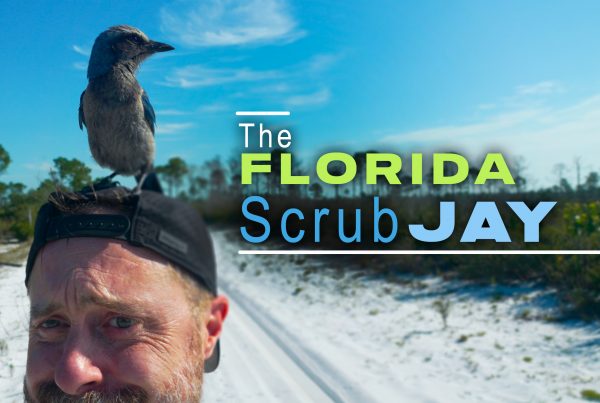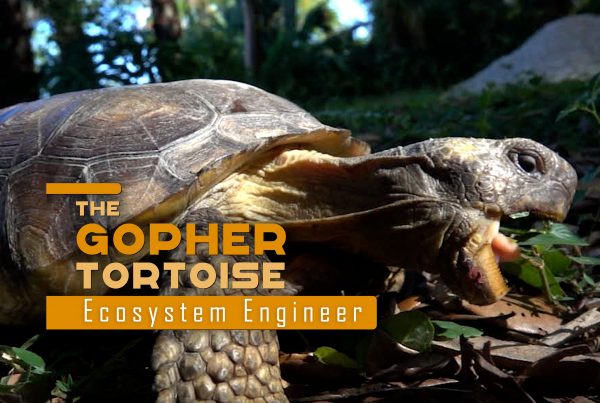Being a small fish in a freshwater pond is no fun. You’re pretty low on the food chain, and you have to constantly watch your back. Alligators, turtles, birds….. even insects might find you to be a tasty treat!
Some fish eat plants. Others eat insects and worms. Bigger fish eat smaller fish. Discuss the various roles that fish can play in a freshwater ecosystem.
Without plants, algae and other producers in an ecosystem, how would that effect the population of predators like alligators or wading birds?
In this video, we see several birds with different shaped bills. Each bill is shaped so that it functions in a different way when catching fish. This is what is called “Specialization.” See if you can identify some of these specializations, and how they are used by the animal.
No Fun Being a Fish
Being a fish in a Florida pond may look carefree and fun, but the truth can be something different. Everywhere you go somebody is sizing you up, putting you in the crosshairs, as if you had a bull’s-eye painted on you.
It starts the moment you hatch, and that’s the real insult: You’re a vertebrate. That backbone of yours puts you up there with the bird, the mammal and the reptile. But for now, you are small, and there are spiders and insects that can kill you. These arthropods have no backbone and only the tiniest of brains, but beware! They are equipped in ways that seem almost sinister and they are stalking you!
Take the giant water bug – an insect that breathes air through a snorkel. It has powerful, hooked legs that can fly shut in an instant. And watch out for the dragonfly nymph. It can shoot out a jaw-like labium that has grabbers on the end. You will be consumed in a hurry.
The water spider, Dolomedes, will hunt you from above. It will sense the slightest swish of your tail and snatch you out of your aquatic world. You will be a fish out of water, so to speak.
Pity the fish, however, that swims between the stabbing arms of the water bug – a scene most disturbing.
As fish grow larger their prospects don’t improve much. Larger animals, especially vertebrates, begin to notice them. Among the reptiles, cottonmouths and other water snakes feed heavily on fish.
Snapping turtles are fish-catching specialists. The common snapper retracts its neck and head and waits for a fish to swim close. With a back full of leeches, everything about this reptile seems creepy.
Unsuspecting fish don’t know what hit them.
The giant alligator snapping turtle has a different approach. A worm-like sliver of skin on the floor of the turtle’s mouth dances and wiggles temptingly. Deception is the name of the game. Eventually a fish gets curious or simply blunders into the gaping jaws.
Alligators are notorious fish predators. Lying still and letting the fish swim to you has caught many a fish off guard. Full-body lunges sometimes fail to produce results……..and forget about the fish, watch out camera-guy!
But of all the animals, birds have developed the most diverse strategies for catching fish:
The anhinga is a swimming spear gun. This bird enters the fish’s world and drives its dagger bill clean through its victim. Then comes the problem of getting the fish off the weapon and into the mouth.
The herons have keen vision and pinpoint accuracy. They can take a minnow so small the average eye wouldn’t see it or turn around and score a really big hit.
The snowy egret sometimes drags its feet to attract minnows, then lunges in to get them without missing a wing beat.
We have even seen the green-back heron toss a bid of sandwich bread into the water to bait up a fish or two. This takes brains.
The wood stork has a bill that trips like a mouse trap. The bird dips its open mandibles into the water and either waits for a fish to swim between them or it encourages a blunder by raking the plants with its foot. The wood stork fishes by touch rather than by sight, but it gets its fish just the same.
Finally, check out these three birds fishing in a group. The ibis stirs things up with its probing bill, feeding by touch. The heron stays close, hoping to jab a fish at the surface, while the grebe dives under to see if the chaos created by the ibis has flushed out any fish hiding in the weeds. This time the grebe gets the prize, but the others strike out.
It’s a bummer being low on the food-chain. There are some fish lucky enough to join the apex predator ranks, but the rest of us primary and secondary consumers have to always watch our backs. With so much lined up against you, it’s no fun being a fish.




